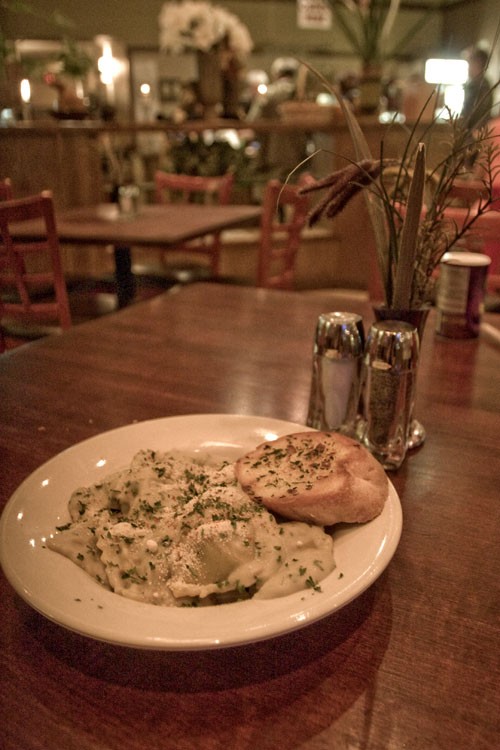Peggy Raisglid walked through the doors of a Unitarian church 20 years ago a “”hardcore carnivore”” and an hour later she walked out a “”committed vegan.””
She heard a lecture that day on vivisection — the process of cutting up animals for either food or cosmetic purposes, she said.
“”It was just so compelling — that day I went out and had my first vegan meal in an Asian restaurant and it was delicious,”” said Raisglid, the owner of Lovin’ Spoonfuls, 2990 N. Campbell Ave., and UA alumnus of 1997. Being vegan is more of a lifestyle, she added, not just a diet.
“”For most people, vegan means no animal products whatsoever,”” she said.
Raisglid opened the restaurant in 2005, despite doubtful reactions. She remembers hearing, “”People will never support a vegan restaurant in Tucson.””
Lovin’ Spoonfuls is the only exclusively vegan restaurant in town, and Raisglid said the restaurant is doing well, with roughly 150 customers daily.
On the menu, customers will find a variety of tofu scrambles for breakfast, soy burgers with organic buns and vegan mayo for lunch, a variety of pasta dishes for dinner and bakery items for dessert.
Lovin’ Spoonfuls also has a full liquor license. “”Initially I didn’t realize that even organic wine is not necessarily vegan wine,”” Raisglid said. “”During the fining process, they remove fines by using gelatin or egg white, which makes it non-vegan.””
When she first opened the restaurant, Raisglid said she did not realize how many vegans there were in Tucson and thought it was just her small circle of friends.
She added that most of her customers aren’t even vegetarians, but rather just like to eat healthier once in a while.
She reminisced about her early days as a vegan living in Los Angeles, saying it was a challenge back then.
“”I had to go miles and miles just to get basic products that were vegan,”” Raisglid said. “”I remember when I first saw soy milk appear in a grocery store, I was thrilled.””
Today, she said shoppers can go to the grocery store and find a dozen different kinds of soy milk.
People commonly inquire how vegans get their protein, but Raisglid said veggetables can be a good source of protein.
Those who have meat-centered diets are receiving too much protein, which often leads to taxing kidneys and other health problems, she said.
“”The top killers in the country are all meat diseases — heart disease, which vegans rarely have unless there is something genetic; diabetes; and breast cancer are all meat diseases,”” Raisglid said.
Certain supermarkets offer vitamins and other supplements for vegans in case they do need an extra boost in their diets.
Darcey French, who works in the supplement department at Sunflower Farmers Market, 4625 E. Speedway Blvd., said that it carries many vegan-friendly products, including vitamins.
“”Vegans usually come in here specifically for supplements that they are in need of such as B-12, iron — things people aren’t getting from a vegan diet,”” French said.
Sue Carolan, who works for customer service at Food Conspiracy Co-op, 412 N. 4th Ave, said the co-op carries a variety of vegan items.
The vegan bacon, lettuce and tomato sandwich is the co-op’s number-one seller, along with bakery items and homemade vegan soups prepared daily.
Carolan is a vegetarian who tried to go vegan but decided it wasn’t for her, she said.
“”If you’re raising children, they really need a balanced diet,”” she said.
A large number of vegan customers still come in inquiring about vegan products regularly, she said.
Some students on the UA campus have strong vegan beliefs as well, as demonstrated through the Students Organized for Animal Rights club.
Stephanie Jaffa, a Spanish and political science junior, is the president of this animal advocacy club and has been a vegan for seven years.
Jaffa was a vegetarian as a child, and then started encountering information online about animal agricultural industries. This information taught her how unhealthy animal products are, she said.
“”I felt obligated to boycott inhumane practicing after that,”” Jaffa said. “”So the logical conclusion was to go vegan and stop consuming animal products.””
She is the only vegan in her family and said the switch to veganism was a challenge, but she was able to adapt and feels that anyone can if they are determined.
Jaffa remembers the real challenge was living in the dorms as a freshman with no kitchen access, she said.
“”For anyone, vegan or not, it’s always easier to have access to your own kitchen. But where there’s a will, there’s a way,”” Jaffa said. “”But there are plenty of eateries around campus that cater to vegans.””
She said there are many vegan-friendly restaurants in Tucson that make it easier to be a vegan in a largely omnivorous world.
“”It is one of the few situations in life that is a win-win situation,”” Raisglid said. “”You win, because it’s a healthier diet, the animals win, because they are not getting slaughtered, and the environment wins because it’s the number one thing you can do to benefit the environment.””









